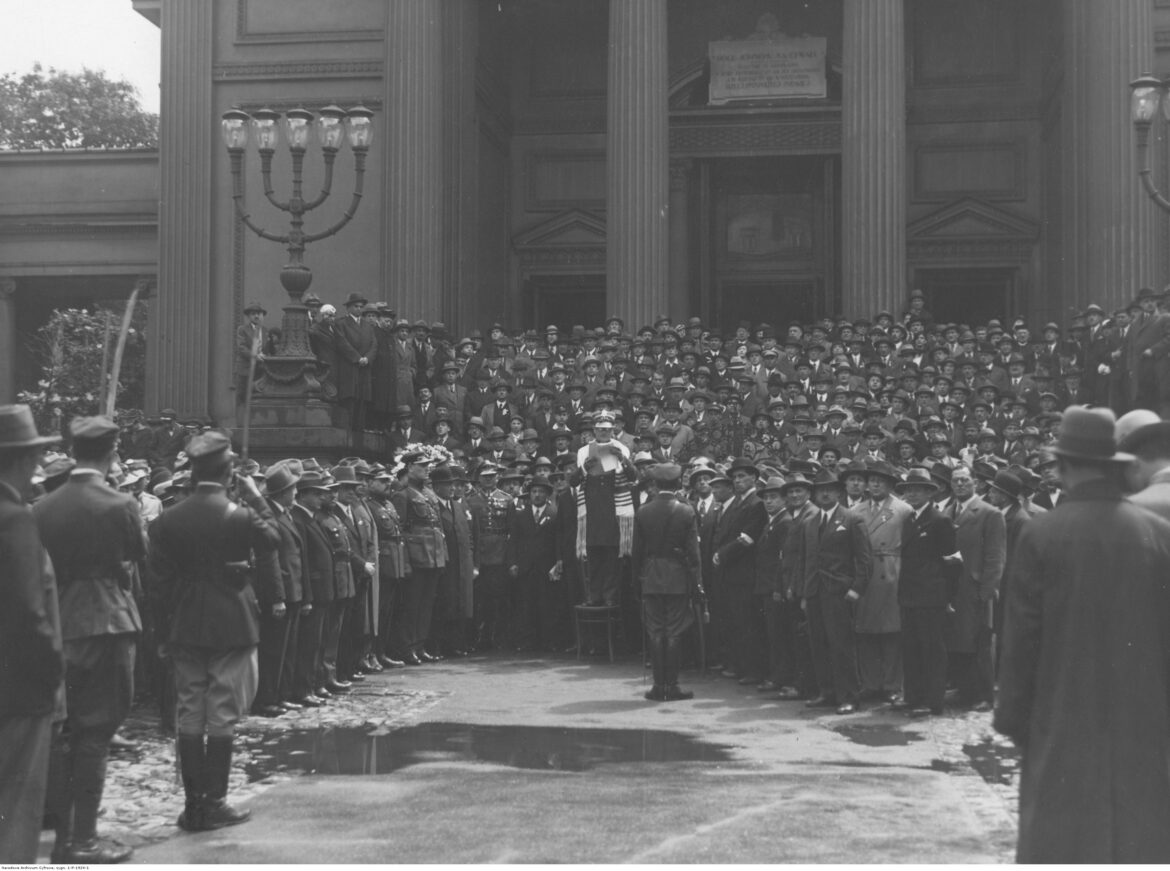Many Jews took part in the First World War battles on both sides of the conflicting powers, including the occupiers of the former Polish Republic [link: https://dignitynews.eu/pl/zydzi-polscy-w-armiach-zaborcow]. Thousands of them saw themselves as Poles of the Mosaic faith during the Partitions, the struggle for the rebirth of the Poland and in the interwar period. They fought for their country, often having been brought up in assimilated families. They considered themselves Jews and Poles, responsible for the fate of their homeland. Others were assimilated into Polishness while serving in Polish army during the First World War.
While growing up among the Polish nation, occupied by Russia, Prussia and Austria, for many national minorities, the struggle for Poland’s independence was the inspiration for their own efforts. This was also true for the Jewish inhabitants of the Poland under partition. Following the example of Berek Joselewicz, [link: https://dignitynews.eu/pl/ziemia-z-grobu-pulkownika-berka-joselewicza-w-kopcu-marszalka-pilsudskiego] during the national uprisings (the attitude of Rabbi Dov Ber Meisels is worth mentioning [link: https://dignitynews.eu/pl/rabin-przesladowany-przez-rosjan-za-poparcie-powstania-styczniowego] or the insurgent Stanislaw (Sinai) Hernish) [link: https://dignitynews.eu/pl/stanislaw-synaj-hernisz-polski-zyd-powstaniec-listopadowy] and in World War I they supported Polish independence efforts. They joined the military ranks with thousands of other Poles.
During World War I
Many Jews collaborated with the later leader of the Polish state, Józef Piłsudski, already within the Polish Socialist Party, founded in 1892, and later in the PPS Fighting Organisation. One of them was the 20-year-old Boruch Szulman, who was killed on 14 May 1906 during the bomb attack on the Deputy Commissioner of the Tsarist police, Nikolai Konstantinov, known for his particularly cruel attitude to prisoners.
In addition to conspiratorial activities, the struggle for a Polish school in the Russian partition was also of great importance, which proved to be for many Jews a preparation for armed participation in the fight for independence. An example of this was the fate of Jan Ruff, who, as a 10-year-old secondary school student in Częstochowa, took part in a school strike in 1905, opposing the Russification of education and demanding the restoration of teaching in Polish. In 1915, during the First World War, already as a soldier of Józef Piłsudski’s First Brigade, he was severely wounded in a battle with Russian troops near Konary. The Jews, who served in the Polish military formation, i.e. the Polish Legions, which functioned as part of the Austro-Hungarian army during World War I, constituted the largest group among national minorities (around 650 people) – altogether between 2 and 2.5% of all soldiers fighting in the ranks of the Legions. In addition, numerous Jews sympathised with the Legions and supported them financially. Jewish legionaries predominantly originated from traditional families, some having assimilated before the First World War, such as Jan Arnsztajn [https://dignitynews.eu/pl/rodzina-arnsztajnow-w-walce-o-niepodlegla-polske], who was brought up in a patriotic family, or the eminent painter and draughtsman Leopold Gottlieb, one of the main illustrators of the Legion’s history. Enthusiastically joining the Legions proved that they considered Poland their homeland, proving that being a Polish patriot did not have to mean renouncing their Jewish identity.
Polish Jews were also soldiers in the Bayonais division on the Western Front, joining General Józef Haller’s Blue Army and numerous civilian and military structures. Others were unable to join the active struggle and were active in other fields, e.g. Wilhelm Feldman [link: https://dignitynews.eu/pl/w-kierunku-asymilacji-wilhelm-feldman-1868-1919] who took up agitation for the Polish cause as head of the press representation of the Supreme National Committee in Berlin.
In the struggle for the borders of the Polish state
Jews also took part in the struggle for the borders of the Republic of Poland – firstly in the defence of Lwów (Lviv) in November 1918. In independent Poland they were decorated with the Cross of the Defence of Lwów (some posthumously).
The next struggle was against Bolshevik Russia. In 1920, it sought to conquer Poland and then intended to continue its offensive into western Europe, but the Bolsheviks were stopped by the Polish Army. Many Jews also served in it and fought in the famous Battle of Warsaw [link: https://dignitynews.eu/pl/bitwa-w-centrum-europy-ktora-odmienila-losy-swiata-slyszales-o-niej] and later in the Third Silesian Uprising against the Germans, the fight for the most industrialised lands of Upper Silesia in 1921. Their dedication was recognised with numerous top awards. More than once, their joint struggle represented an important step towards integration and closer ties with the Polish state.
In the Second Polish Republic
After the end of the wars for the borders of the Republic, only some of the combatants remained in active military service. Most of them returned to civilian occupations or continued their education. After their studies, they often formed intelligentsia milieu. Many of them remained reserve officers, but some decided to continue their careers in the Polish Army.
At the end of 1929, the Union of Jewish Participants in Struggles for Poland’s Independence was founded, an organisation of Jewish participants in the fights for independence, proclaiming a programme of work for the development of the Republic and Polish-Jewish cooperation. The Association was also active among young people, organising camps and summer camps and supporting Jewish scout teams. In 1938, the organisation had around 6750 members within 78 branches. For a short time, it published its own magazine, “On the Breakthrough”. In 1938, one of the Union’s activists, Zdzisław Żmigryder-Konopka, became a senator.
And war again…
Many Jews again fought to defend Poland in 1939. During the Second World War, they were exterminated by the German occupiers and at the same time deported to gulags [link https://dignitynews.eu/pl/zsylka-w-bydlecych-wagonach-ostatnia-czwarta-deportacja-polakow-na-syberie-w-czerwcu-1941-r.] as class enemies (e.g. merchants, bourgeoisie, clergy) by the Soviets. Under German occupation, they perished with their families in executions and extermination camps, and under Soviet occupation – in Katyn [link: https://dignitynews.eu/pl/doktor-jerzy-lucjan-kempner-patriota-zydowska-ofiara-zbrodni-katynskiej] and other death camps as Polish soldiers.
Nowadays, the contribution of Jews to the struggle for an independent Poland is commemorated not only by academic and popular publications, but also by historical exhibitions organised by Polish institutions [link: https://dignitynews.eu/pl/wystawa-ramie-przy-ramieniu-zydzi-w-polskich-dazeniach-niepodleglosciowych-1794-1918].





